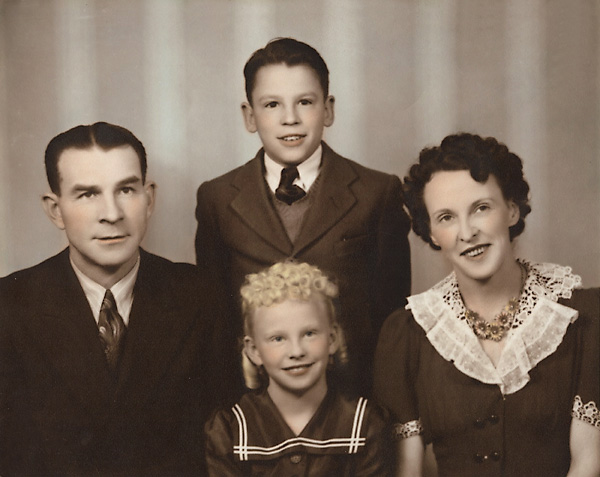 |
||
|
Leona Ryset was the ninth child of Frank and Priscilla Morgan Ryset.
|
|||
|
In the picture above are, left to right: Jack L. Conn, born 16 March 1903 in Glasco, Cloud, Kansas the son of George Conn and Della Kimberling. He died 12 October 1979 in Idaho Falls, Idaho. Standing Center, Clayton Conn (age 9). Sitting center, Jackie Conn (age 5). Right: Leona Ryset, born 12 February 1908 in Shelton, Bonneville, Idaho. Married 8 October 1928 in Idaho Falls, Idaho, to Jack Conn. She died 4 January 1990 in Terreton, Jefferson, Idaho. Picture made in 1939. MEMORIES by Leona Ryset Conn Today, while wandering in a remote corner of my garden of memories, I found a small girl and a tall man. The girl in a faded but clean calico dress, with hair in braids, was disheveled and travel worn. The man in work overalls and a slouch hat, had an air of confidence and purpose in his stride. Yes, the little girl was me and the man was "My Dad." It was the second day of a two day journey to the new home we were going to build in the wilderness. Spring was in the air, the trees were all leafed out and the birds were singing by the road-side. As we walked the winding road up the hill, I remember catching hold of my Father's large toil worn hand and looking up at him asked, "How much father, Daddy?" He answered as he had many times that day, "Just over the next hill." I glanced at him and as I looked up at him I thought, "How like a big tall tree which was standing by the side of the road," so tall and strong with new strength and vitality. Dad had faith and hope in this new venture he was about to embark upon. He realized that the land we had in the valley was not enough to make a substantial living for such a large hungry brood of children, so he had decided to file on dry farm land and prove up on it. He really thought he could make a lot of money. It was the first trip we were making and we had several wagon loads of food, clothing, bedding, and supplies. We were herding milk cows, calves, pigs and horses. We even had chickens in one wagon. Our dear Mother was driving one wagon, we younger kids rode with her. We would get out and walk to rest. On this first trip, I am afraid we children became very tired and we had begun to beg and ask how much farther we had to go. Dad would tell us "just over the next hill," and when we would get to the top we would look down and see no cabin, which he had gone ahead and built. Imagine our dismay when he would say, "Oh, maybe I made a mistake, surely the next hill." Finally when we reached the top of the hill and looked down on a large valley, the cabin looked so very small, from the distance, that I will never forget the look of disappointment in my Mother's eyes when she saw it. I am afraid my Daddy had laughingly told her that the cabin he had built was much larger. I think we lived in tents and the one little room until another room and a shanty was added on. The two rooms had wooden floors in them, but the shanty just had the dirt floor. There was running water if one wanted to run to the spring to get it. The spring was quite a ways from the house and I can remember our Mother setting the big buckets of nice cool water down while she rested before carrying it back. It was busy days for all of us. We were assigned tasks and we knew we had to do them. Dad, Mom, and the boys toiled endlessly clearing off sage brush and getting the fields ready to seed grain. Some of the girls would have to get in cows and milk them while others would be getting breakfast. I remember one of my jobs was to arise early and go find the calves, which were turned out at night, when the cows were penned up. The dew would be on the grass and when we would listen for the bell, one of the calves wore to tell us which direction to go looking for them, we would hear the trill of the Meadow Lark and the call of the Morning Dove. The faithful dog would run ahead and scare up Jack Rabbits and Sage Hens. I was always happy when he would lose the race with the rabbit. When we found the calves the dog knew more about gathering them up and running them in than we did. These days weren't all toil and hard work. There was laughter and happiness in that home we built in the mountain, for there must be happiness where love dwells. In the fall of the year we moved back to the valley. On the way, as we passed the big tall tree and I had admired so much in the spring, I had a hard time finding it, as the leaves had all fallen off. The winds and the storms had torn its branches. It didn't look nearly so tall and strong. We spent our summers up at the dry farm for several years. They were enjoyable times even though they were filled with hard work and trials. Years passed, and again I looked at my Dad. I didn't have to look up so far at him now. I thought of the tree and how my Dad resembled it. The trials and storms of life had left their mark on him as they had the tree. He was bent and worn. The strength and vitality I had seen in him so long ago was about spent. He never did find the pot of gold he was looking for, but on his death bed, as his eyes traveled from one to another of us, there was no fear. He wasn't afraid to meet his Maker. He died a rich man. I like to think that somewhere in the great beyond, two brave and humble spirits are toiling side by side, and when I wonder if when they are trudging to the top, he is urging and encouraging her on by saying, "Come on, just over the next hill." |
|||
